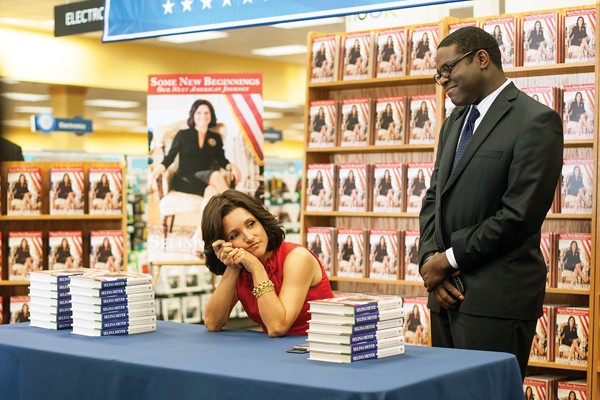It seems as though not enough has been made about the greatness of Julia Louis-Dreyfus and her current show, Veep, which just completed its third season — if it’s possible that an actress who has won consecutive Emmys for Outstanding Lead Actress in a Comedy Series could be considered having gone “under the radar.” Louis-Dreyfus is best known for playing Elaine from Seinfeld, the kind of career stele so monumental it threatened to overshadow anything else she’d ever do.
Her performance in Veep as U.S. Vice President Selina Meyer, 14 years after Seinfeld ended, topples that possibility. Meyer may even be a better character than Elaine — though it should be caveated that I’m the kind of revisionist who prefers Futurama to The Simpsons and The Dark Knight Rises to The Dark Knight.
The premise of Veep is that the second-most powerful person in the free world, the American VP, a heartbeat away from the presidency, is so unimportant and ineffectual a figure that they are shut out of White House decision-making, assigned humiliating tasks, and roundly ignored except for the occasional political blunder.
 Paul Schiraldi
Paul Schiraldi
Julia Louis-Dreyfus and Sam Richardson
Louis-Dreyfus is, at the risk of hyperbole, exquisite in the role. She has the right mix of intelligence, polish, and charisma to be believable as an electable politician and attractive running mate but adds to it enough inelegance, foolishness, and insensitivity to prove she doesn’t merit anything greater. Meyers’ political ambition is matched only by her ability to unwittingly thwart it. Parks and Recreation‘s Amy Poehler is the only one in the medium who matches Louis-Dreyfus’ timing, delivery, and chops for physical comedy.
Meyer belittles her staff, cursing to a degree worthy of a sailor’s swear jar — everybody on the show does, actually. But what makes Veep‘s crudeness so endlessly enjoyable is that the characters (i.e., the actors and writers) seem to be constantly searching for the single greatest putdown a scenario can have. Veep‘s style is to keep a scene going past the point of when the critical plot information is conveyed, just to watch characters interact. The dialog is either improvisational or wielded so that it appears organic to the situation. My all-time favorite: Meyer calls the tall, unctuous White House liaison, Jonah (Timothy Simons) a “jolly green jizz-face.”
In addition to Jonah (my favorite character on the show after Meyer), the Veep ensemble is stacked with greatness: chief of staff, Amy (Anna Chlumsky); personal assistant, Gary (Tony Hale); spokesperson, Mike (Matt Walsh); political operative, Dan (Reid Scott); office administrator, Sue (Sufe Bradshaw); prez chief of staff, Ben (Kevin Dunn); strategist, Kent (Gary Cole); and Selina’s daughter, Catherine (Sarah Sutherland). There’s no duplication in personality in the group, except that they are all beloved fools and jackasses.
Veep was created by Armando Iannucci, who directed and co-wrote the amazing political-diplomatic film satire In the Loop. Though Scottish, his ear for bureaucratic idiocy is so strong — or else the notion so universal — he evinces a firm grasp of the farcical machinations and absurd argot spoken inside the Beltway.